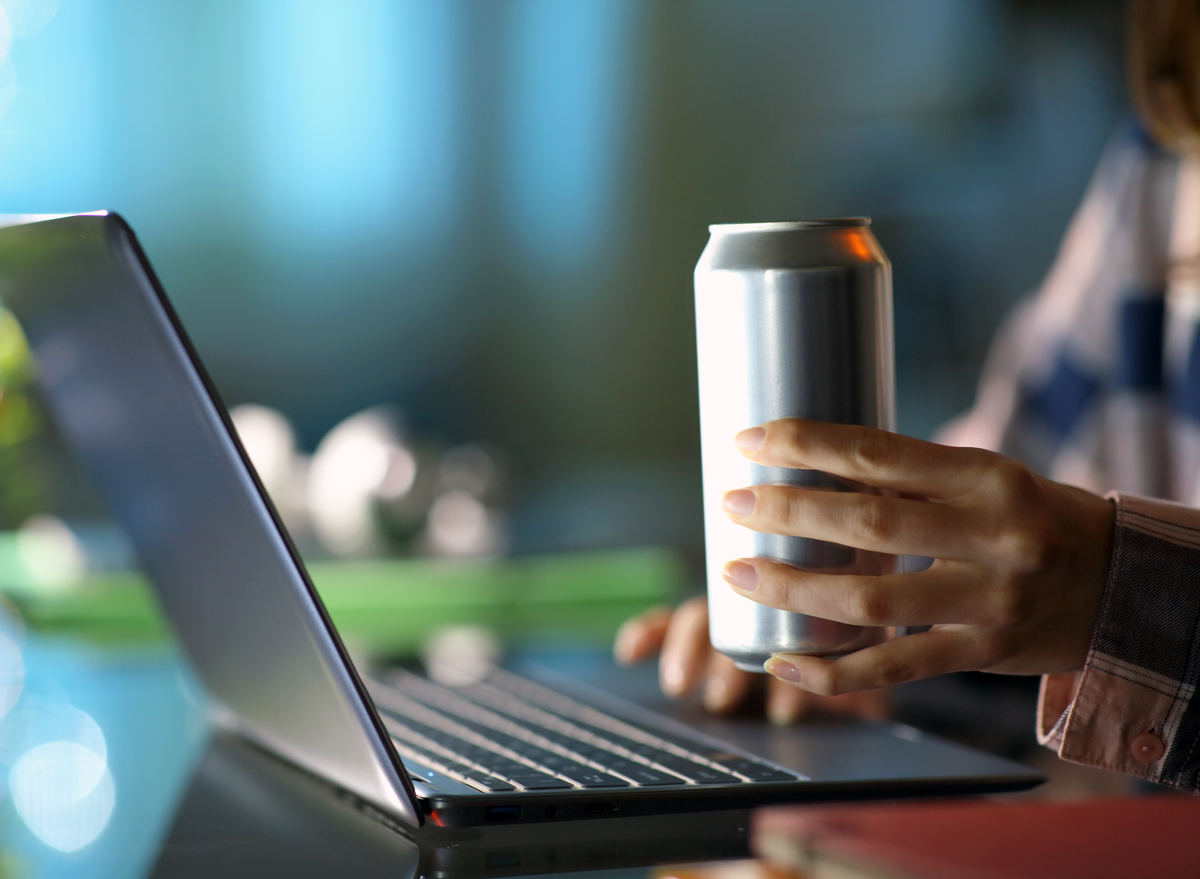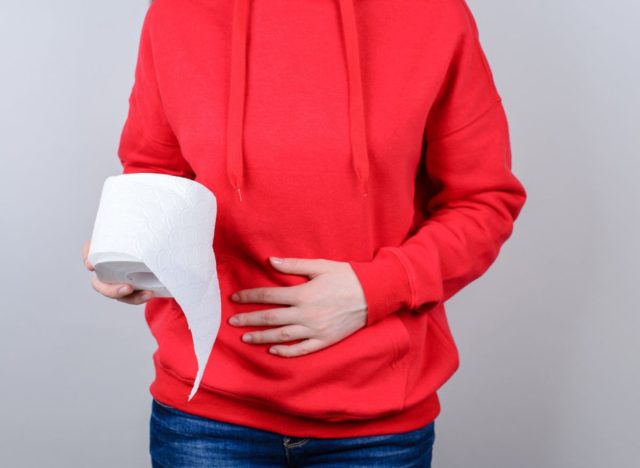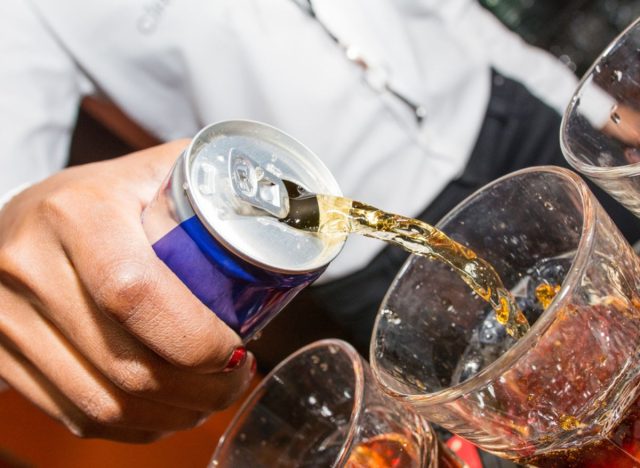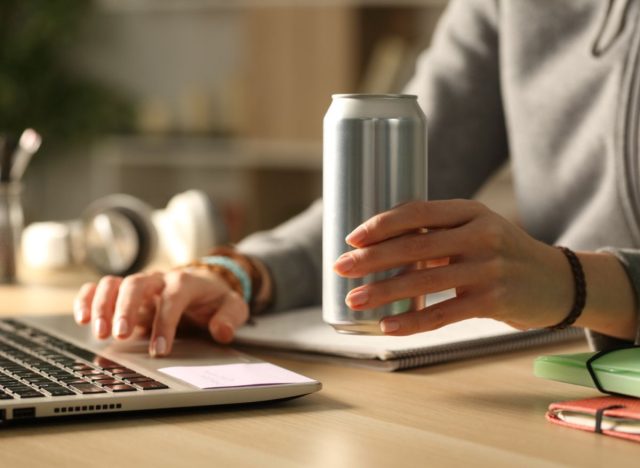What Happens to Your Gut When You Drink Energy Drinks

Sometimes there just aren’t enough hours in the day to get a good night’s rest. And where there’s a lack of sleep, there’s usually a lack of energy and/or productivity throughout the day—hence why many people lean on a liquid source of caffeine such as an energy drink.
Per FDA recommendation, it’s generally safe for adults to consume up to 400 milligrams of caffeine on a daily basis. Energy drinks can contain anywhere from 50 milligrams to 500 milligrams of caffeine, and it can make quite a difference in comparison to a simple cup of coffee, which only has about 100 milligrams.
It’s possible that “energy drinks affect your gut, primarily due to their caffeine content,” says Mike Bohl, MD, MPH, Director of Medical Content and Education at Ro (healthcare technology company) and member of our medical expert board. “Unlike coffee, though, energy drinks often contain many other stimulants as well,” going on to say that, “one of the most common additional ingredients is guarana, a plant that contains a higher concentration of caffeine than coffee beans.”
The overall benefits of caffeine—including better concentration, memory, and reaction time—may not outweigh the negative effects these pick-me-up drinks can have on your digestive system. Aside from added sugars and artificial flavoring, energy drinks can have both natural and chemical-based ingredients and when mixed with such a high caffeine content, your gut ends up paying the price in many unfortunate ways.
Let’s take a closer look into how your gut gets into trouble when you are regularly consuming energy drinks. Read on, and for more on how to eat healthy, don’t miss The #1 Best Juice to Drink Every Day, Says Science.
You may experience more heartburn or reflux disease.

If you ever experienced a burning sensation in your chest or signs of acid reflux after drinking one of your favorite energy drinks, you’re not alone. It’s actually a very common side effect, that starts in your gut, after drinking such a highly caffeinated beverage.
“In the stomach, caffeine increases acid secretion,” Dr. Bohl explains, “this can cause worsening symptoms in people who have heartburn or reflux disease, and it can exacerbate ulcers and cause gastritis (a fancy word for inflammation of the stomach).” Especially if you have chronic acid reflux (GERD), it’s possible you may experience mild to severe symptoms, like a bad taste in the throat or mouth, tooth decay, nausea or vomiting, and possible respiratory problems (for example: wheezing, coughing, chest congestion, asthma).
That being said, the American College of Gastroenterology (specialists in the digestive tract) no longer recommends continuous changes to one’s diet for the treatment of reflux and GERD. This is due to the lack of research to support eliminating caffeine as a solution to GERD symptoms.
Your bowel movements may change.

Another common consequence that your gut may experience, especially after an energy drink, will happen when you try to use the restroom.
When you consume caffeine, your body’s motility—how fast your stomach contracts to move food through it— will increase and you may notice a couple of things begin to happen. Dr. Bohl says, “you may need to go to the bathroom shortly after consuming caffeine, and some people may experience diarrhea or worsening of irritable bowel syndrome (IBS) symptoms.”
Your digestion and immune function may be disrupted.

When you have a healthy digestive system, it’s much easier to function on a daily basis. The combination of sugar and caffeine in energy drinks may put a damper on simple gut functionality.
“One study has found that the high sugar content that some energy drinks contain may play a role in reducing the activity and diversity of the gut flora—the bacteria that normally live in the gut and play a role in healthy digestion and immune function,” according to Dr. Bohl.
Healthy moving bacteria is crucial in your gut so that you can fight off infection and create a stable environment in your stomach, but studies have found that it’s possible the types of sugar used in energy drinks can disrupt this process. Specifically, the artificial flavors and sweeteners are what can inhibit the growth of beneficial bacteria in the gut and in turn support the growth of harmful microbes.
You may experience stomach distress and weight gain.

It’s not uncommon for energy drinks to be jam-packed with sugar, alongside a lengthy list of ingredients you can’t begin to know how to pronounce. Plus, you will absolutely feel it in your gut when these sugars begin to settle in.
“Most energy drinks are sweetened with real sugar or artificial sweeteners and also include artificial flavors which can cause gastrointestinal distress [and] weight gain,” says Sydney Greene, MS, RD, a registered dietitian on the Medical Expert Board with various nutrition specialties (including chronic digestive issues).
As the sugar hits your gut, your body goes through gastrointestinal distress, which can show up in ways like constipation or irritable bowel syndrome (IBS), according to Cleveland Clinic.
You may notice more gas and bloating.

If your future goals are to have a flat stomach or lose weight, then energy drinks are not the way to go. In fact, a lot of research has shown that carbonated energy drinks can cause gas and bloating, Greene explains. There is dissolved carbon dioxide found in carbonated drinks, which can turn into gas as it reaches and is digested in your stomach (or the GI tract).








